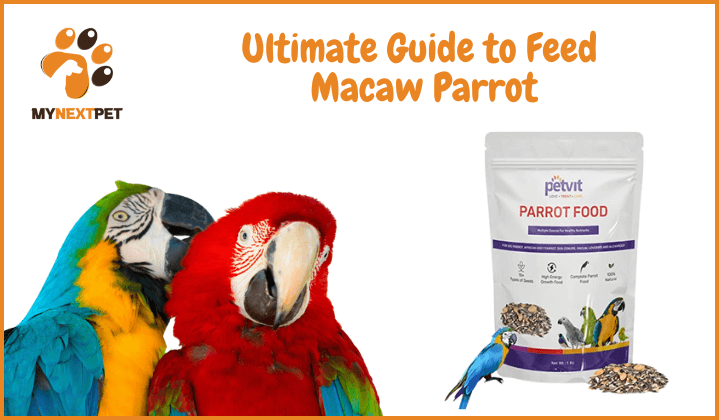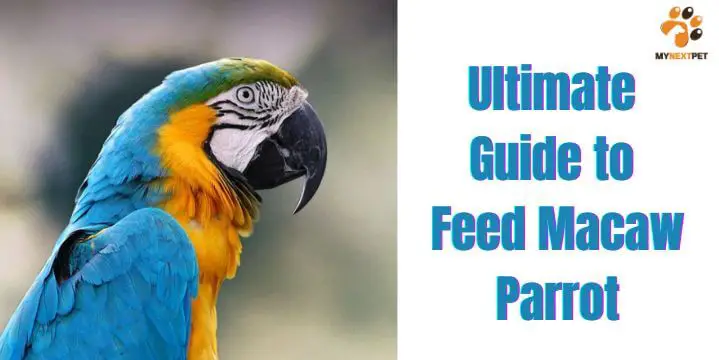Macaws are known for their vibrant colors and playful personalities, making them popular pets among bird enthusiasts. If you are thinking to add Macaw parrot in your family, you must have to check Macaw Parrot Price in India and if you already owned this bird then you must know that proper care and feeding are crucial for the health and well-being of these beautiful birds. This blog post will cover the basics of macaw parrot feeding, including what to feed, how much to feed, and when to feed.

Types of Food for Macaw Parrots
Macaws, like all parrots, are omnivorous and require a varied diet to thrive. They eat various wild fruits, nuts, seeds, and insects. As pets, they can be fed a combination of commercial pellet food, fresh fruits and vegetables, and various seeds and nuts.
Pellets: Pellet food is a convenient and balanced option for feeding your macaw. It is specially formulated to provide all the essential nutrients that macaws need and is also easy to store. However, choosing a high-quality pellet food is important, as some brands may contain fillers or artificial ingredients.
Fruits and Vegetables: Fresh fruits and vegetables are an important part of a macaw’s diet, as they provide essential vitamins and minerals. Some good options include apples, pears, oranges, bananas, carrots, and leafy greens. It is important to note that not all fruits and vegetables are safe for macaws to eat, so always check for any toxic foods before offering them.
Seeds and Nuts: Macaws enjoy a variety of seeds and nuts as part of their diet. Some popular options include sunflower seeds, almonds, walnuts, and pumpkin seeds. However, it is important to remember that seeds and nuts should be offered in moderation, as they are high in fat.
Don’t Feed Macaw Parrots
It is important to note that macaws should not be fed avocado, chocolate, caffeine, alcohol, or processed foods, as they are toxic to parrots.
Important: It is also essential to provide clean and fresh water all the time.
Overall, it is significant to provide a balanced diet for your macaw by offering various foods and monitoring its weight and overall health regularly. A diet that is too high in fat or too low in certain vitamins and minerals can lead to health problems, such as obesity and feather plucking.
Feeding Schedule for Macaw Parrot
In general, macaws should be fed twice a day, once in the morning and once in the evening. A proper feeding schedule is essential for maintaining the health and well-being of your macaw.
Morning Feeding: The morning meal should consist of a variety of fresh fruits and vegetables and a small serving of pellets or seed mix. This food will provide your macaw with the energy and nutrients to start the day.
Evening Feeding: The evening meal should be more substantial and can include a larger serving of pellets or seed mix and some cooked or steamed vegetables. This meal will give your macaw the energy through the night.
It is also important to provide your macaw with fresh water throughout the day and to clean its food and water dishes regularly to prevent bacterial growth.
It is also important to note that macaws are active birds and need to have access to food all the time. Therefore, it is important to provide a variety of food sources, such as feeding balls, foraging feeders, and other interactive feeding devices, to keep your macaw mentally and physically stimulated.
Observing your macaw’s eating habits and weight is also important to ensure it gets the right amount of food. A macaw that is losing weight may need to be fed more, while an overweight macaw may need to be fed less.
Overall, a well-structured feeding schedule is crucial for maintaining the health of your macaw and can help prevent common health problems. It is also important to consult a veterinarian or an avian specialist for a personalized feeding plan for your macaw.
Supplements and Vitamins for Macaw Parrot
While a balanced diet is essential for maintaining the health of your macaw, supplements and vitamins can provide additional support for its overall well-being. Here are some supplements and vitamins that are commonly recommended for macaws:
Vitamin A: This vitamin is essential for maintaining good vision, healthy skin, and a strong immune system. Vitamin A can be found in fresh fruits and vegetables, such as carrots, sweet potatoes, and leafy greens.
Vitamin C: This vitamin is important for maintaining a strong immune system, healthy skin and feathers, and proper healing of wounds. Vitamin C can be found in fresh fruits and vegetables, such as oranges, kiwi, and bell peppers.
Calcium: This mineral is essential for maintaining strong bones, healthy muscles, and proper nerve function. Calcium can be found in fruits and vegetables, such as broccoli and kale, and it can also be provided as a supplement.
Omega-3 fatty acids: These essential fatty acids are important for maintaining healthy skin and feathers and a healthy nervous system. They can be found in various seeds and nuts, such as flaxseed and chia seeds, and they can also be provided as a supplement.
Probiotics: These beneficial bacteria help to maintain a healthy digestive system, which is essential for overall health. They can be found in fermented foods, such as yogurt, and can also be provided as a supplement.
Please note that an overdose of vitamins and minerals can harm your macaw’s health. Therefore, it is always recommended to consult with a veterinarian or an avian specialist for personalized recommendations for your macaw.
In addition, it is also important to note that macaws can get some vitamins and minerals from natural sources such as branches and trees, where they can chew and forage. Therefore, it is important to provide a variety of natural sources as well.
Common Feeding Mistakes to Avoid
Feeding your macaw the right diet is crucial for their overall health and well-being. However, some common feeding mistakes can be easily made by the owner. Here are some mistakes to avoid when feeding your macaw:
Feeding a diet that is too high in fat: Macaws require a balanced diet, and a diet that is too high in fat can lead to obesity and other health problems. Be sure to limit the number of seeds and nuts in your macaw’s diet and monitor its weight regularly.
Feeding a diet that is too low in certain vitamins and minerals: A diet lacking in essential vitamins and minerals can lead to health problems such as feather plucking, lethargy, and other problems. Be sure to provide a variety of fresh fruits and vegetables and high-quality pellet food to ensure that your macaw is getting all the essential nutrients it needs.
Not providing fresh water: Macaws require fresh water at all times, and it is important to regularly clean and refill their water dish.
Feeding toxic foods: Some foods, such as chocolate, avocados, and alcohol, are toxic to macaws and should be avoided at all costs. Always check for toxic foods before offering them to your macaw.
Feeding a monotonous diet: Feeding the same food can lead to boredom and picky eating habits. It is important to provide a variety of foods to keep your macaw mentally and physically stimulated.
Not monitoring the bird’s diet and weight: Monitoring your macaw’s diet and weight is important to ensure that it gets the right amount of food and detects any potential health problems early on.
By avoiding these common feeding mistakes, you can ensure that your macaw gets the proper nutrition to stay healthy and happy. Remember to consult a veterinarian or an avian specialist for a personalized feeding plan for your macaw.
Conclusion and Recommendations
In conclusion, feeding your macaw the right diet is crucial for overall health and well-being. Macaws are omnivorous birds and require a balanced diet that includes a combination of commercial pellet food, fresh fruits and vegetables, and a variety of seeds and nuts. It is also important to provide fresh water and to monitor your macaw’s diet and weight regularly.
It is also important to provide variety in your macaw’s diet to keep it mentally and physically stimulated. Additionally, providing supplements and vitamins can provide additional support for your macaw’s overall health. Still, it is always recommended to consult a veterinarian or an avian specialist for personalized recommendations.
It is also crucial to avoid common mistakes such as feeding a diet that is too high in fat, not providing fresh water, feeding toxic foods, not providing variety, and not monitoring the bird’s diet and weight.
In summary, a well-structured feeding schedule and a balanced diet are essential for maintaining the health of your macaw and can help prevent common health problems such as obesity and feather plucking. It is always important to consult with an avian specialist for personalized recommendations for your macaw.
